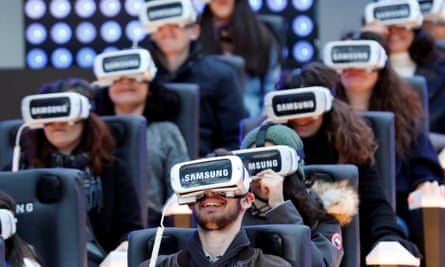Even now, well into the second decade of the 21st century, we tend to view video games as a guilty pleasure. For anyone over the age of 25, they’re often something you sneak off to do when no one is at home. They’re a furtive treat, filled with the cultural equivalent of empty calories.
Partly this is to do with how video games have been marketed for the last 30 years – predominantly at teenage boys. The games industry has taught us to see games as loud, brash and arcane. On top of this, the most visible titles tend to conform to familiar stereotypes: Call of Duty is about killing enemies; Candy Crush Saga is about killing time. When you’re not entrenched in games, these highly marketed titles become representative – you don’t see the other things going on behind these entertainment monoliths. It’s just like, if you only go to the cinema in the summer, you’re in danger of thinking that all movies involve indestructible people wearing capes.
But the last five years has seen a huge renaissance in video game design. The democratisation of the medium (through cheap development tools and the rise of super-fast broadband) has brought in new voices and ideas. Fascinating things are happening.
So here are seven reasons why, if you haven’t played many video games in the past, or still feel a little self-conscious about your Xbox or PlayStation, you should try more video games this year – and not feel bad about it.
They’re economical

As the global economy shows few signs of drastically improving, getting the most out of our entertainment choices is going to be important this year. And video games remain astoundingly good value. A big mainstream release like Witcher 3 or Fifa 2017 will cost around £50 on console and less on PC, but they can provide hundreds of hours of entertainment. Take the online shooting game Destiny. A year after the game’s release, a study of player patterns found that the average session was three hours, and the average player had put 77 hours into fighting alien monsters. That’s an enormous amount of entertainment for that initial £50 outlay.
Most titles have replayability features built in. Big adventure games like Dishonored, Assassin’s Creed and Tomb Raider are filled with sub-quests, hidden areas and collectible items that encourage and reward replay and exploration. Competitive multiplayer titles such as Overwatch, Fifa and Rocket League effectively function like sports – you play and improve over many months, discovering new skillsets and features. And of course, waiting a few weeks before buying a game, or looking out for sales on download sites like Steam, Xbox Live and PlayStation Network, will get you those experiences for even less money.
They’re culturally prescient

A lot of the people now making, producing and funding television and movies grew up playing video games – and that influence is becoming ever more obvious and important. Two of the most interesting television programmes of 2016, Mr Robot and Westworld, were inspired by game design and conventions – the latter has been widely read as a comment on the sorts of interactive immersive worlds we find in games. We’re now seeing the very structure, culture and design principles of games being expressed and explored in traditional narrative media.
From the deeply interconnected Marvel movies, filled with easter eggs, clues and puzzles, to the rise of immersive theatre productions, we’re being asked to take more of an active role in the entertainment we consume. So playing video games is effectively preparing you for the future of broadcast media, and ensuring you understand what’s going on in, say, the next Ready Player One, or Stranger Things or the films of Alex Garland, JJ Abrams or Duncan Jones.
They’re social

The popular stereotype of the lone gamer sat in a bedroom staring at a screen was never particularly accurate, but now its laughably out of date. Most titles have multiplayer components that let you easily play against other people online – but if that’s too intimidating, there are also a lot of “local” or “couch” multiplayer games that you can share with friends in the same room. Recent examples include the hilarious cooperative kitchen game Overcooked, the crazed VR experience Keep Talking and No One Explodes, and the beautiful puzzler Lovers in a Dangerous Spacetime. But you can also pick up a cheap old Xbox 360 or PlayStation 3, grab a copy of Rock Band or Guitar Hero and enjoy many nights of terrifyingly incompetent karaoke fun.
But in a lot of important ways, almost all games can be shared. I know a lot of couples who sit down and play adventure games like Life is Strange or Walking Dead together, taking turns with the controls, helping each other, discussing tactics and options. We learn a lot about our friends through play, and how you cooperate on video game tasks is a pretty good indicator on how you will cope with real-life challenges. In short, video games will save your relationship. I’m only half joking.
They’re the future of self-expression

Thirty years ago, when young angry people wanted to express something about their lives, they would pick up a guitar and write a song; if they wanted to tell a story, they might have written that as poetry or bought a camcorder and made a film. Now they’re just as likely to make a game. Cheap tools like Unity, free creation packages like Twine and Scratch, all put development into the hands of anyone with a basic laptop. Creators like Anna Anthropy, Nina Freeman, Robert Yang and Jason Rohrer make idiosyncratic, personal, troubling, unusual and political games, exploring new avenues for self-expression, pushing at the boundaries of what games are and what they can say. Games have become the permissive creative space that punk rock once was.
On a more mainstream level, we’re gradually seeing the barriers between interactive and linear media being broken down. Over the last decade, from Dubplate Drama to Defiance, there have been halting experiments in transmedia – the combination of game, web and television elements to create new story forms – but these will inevitably become more common as generation swipe matures. Games will break out of two-dimensional screens and into rooms, either through VR or AR, or through new combinations of TV and tablets. It’s possible that in twenty years, the idea of sitting down and just watching a narrative drama will seem outdated and anachronistic. So you may as well start practising now.
They tell us where technology is going

Video game players are hugely demanding when it comes to interface design – both in terms of input devices (ie controllers) and in-game information displays. Video games are also pushing the envelope when it comes to artificial intelligence, procedural content generation and physics modelling. This means a lot of the technologies that are going to affect our lives in the next decade are being tested and developed in the video game sphere.
Sometimes this is obvious. Currently, most virtual and augmented reality development is in video games: the PlayStation VR, Oculus Rift and HTC Vive headsets are mostly being used to make games, but that won’t always be the case – when headsets become less unwieldy and when more movie and television companies start to explore the possibilities of 360-degree video, VR and AR experiences are going to become a lot more common. We’ll be shopping in VR, attending sports events in VR, using AR to redesign our living rooms. Learning about these technologies now is a good idea.
But there are less obvious ways that games are taking a role in shaping our futures. Video games have become important testbeds for artificial intelligence research. The Google-owned AI company DeepMind tests its intelligent programs by pitting them against video games – the latest example is StarCraft. In the US, Dr Mark Riedl and his colleagues at Georgia Tech university have developed a game-like narrative platform called Quixote, where AI agents are able to learn moral lessons from player-created stories; this approach could well be used in the coming years to teach robots how to make moral decisions. Microsoft’s research department in Cambridge is using Minecraft to test and teach AI bots.
The future of communication with our major service providers – from banks to retailers – is with intelligent chatbots. Games offer practice in talking to machines.
They tell us about our kids

With the arrival of smart phones and tablets, games are more pervasive than ever. Children are now growing up expecting all screens to be interactive – a phenomenon that’s being referred to as generation swipe. They are using tablets in school, they’re being taught to code, and they’re creating apps. They are digital natives. Alongside this, the mass adoption of social media platforms like Instagram, Snapchat and YouTube has given rise to a new relationship between teens, technology and entertainment. Kids expect to be able to interact. They watch Stampy or PewDiePie on YouTube and interact with pro gamers and vloggers on Twitch streams – they communicate with each other through memes and photos. A lot of the interfaces they use are game-like. So understanding video games is important.
But more than this, playing video games with your kids is joyous. Whether that means building a castle together in Minecraft, or a functioning rocket in Kerbal Space Program, or just solving puzzles and breaking things in Lego Dimensions, it’s a way of meeting with your children in a domain they enjoy and feel comfortable. It lets them take the lead; it lets them show you stuff. The skills are also transferable and can expand into the real world. The obvious example is Pokémon Go, the AR game which turns local landmarks into playable spaces – my sons have learned more about their hometown through playing this game than through years of just walking around. But games can also stimulate an interest in architecture, ecology, physics, logic, philosophy ... I’m an optimist in this area; some argue that video games provide only insular lessons applicable solely within their own worlds. But having a child on the autism spectrum, I have seen first-hand how games can inspire an interest in the world and its mysteries.
They’re fun

Did I mention this? Games are fun. They provide fascinating worlds to explore and take part in, they let us do incredible, sometimes terrible things without recourse. They test out intelligence and reaction; they posit weird futures and possibilities; they let us take control of lives and bodies that we could never own or experience. They are made by artists and visionaries, they provide moments of utter transfixing beauty and resonance. The glowing sunset over the city of Los Santos in GTA V, the swoop of a dragon over the plains of Skyrim; the desperate struggle to survive in the snowy wastelands of The Long Dark; the heart-wrenching power of friendship in Life is Strange – these are valid forms of escape and experience; they tell us things.
In 2017, a year of uncertainty and vast technological change, it is time to see video games alongside – and equal to – books, television and cinema as a popular imaginative medium. It is OK to play.

Comments (…)
Sign in or create your Guardian account to join the discussion